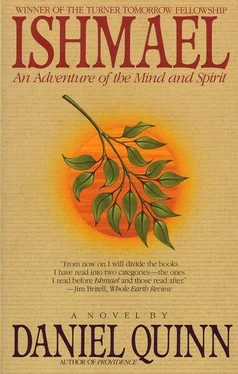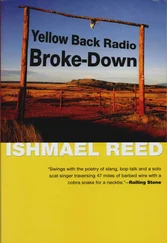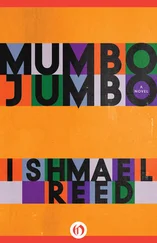“What makes you say that?”
“I don’t know. It’s my impression.”
“Yes, but what’s the basis for the impression?”
“I think it’s this. I don’t know what story all these people are enacting, but I can see that they’re all enacting the same one. I can’t spell the story out as yet, but it’s clearly there—in distinction to the story the people of my culture are enacting. Wherever we encounter them, they’re always doing much the same sort of thing, always living much the same sort of life—just the way that wherever we encounter us , we’re always doing much the same sort of thing, always living much the same sort of life.”
“But what’s the connection between this and the transmittal of that cultural accumulation that mankind made during the first three million years of human life?”
I thought about it for a couple minutes, then said, “This is the connection. The Leavers are still passing that accumulation along in whatever form it came to them. But we’re not, because ten thousand years ago the founders of our culture said, ‘This is all shit. This is not the way people should live,’ and they got rid of it. They obviously did get rid of it, because by the time their descendants step into history there’s no trace of the attitudes and ideas you encounter among Leaver peoples everywhere. And then too…”
“Yes?”
“This is interesting. I’ve never noticed this before…. Leaver peoples are always conscious of having a tradition that goes back to very ancient times. We have no such consciousness. For the most part, we’re a very ‘new’ people. Every generation is somehow new, more thoroughly cut off from the past than the one that came before.”
“What does Mother Culture have to say about this?”
“Ah,” I said, and closed my eyes. “Mother Culture says that this is as it should be. There’s nothing in the past for us. The past is dreck. The past is something to be put behind us, something to be escaped from.”
Ishmael nodded. “So you see: This is how you came to be cultural amnesiacs.”
“How do you mean?”
“Until Darwin and the paleontologists came along to tack three million years of human life onto your history, it was assumed in your culture that the birth of man and the birth of your culture were simultaneous events—were in fact the same event. What I mean is that the people of your culture thought that man was born one of you . It was assumed that farming is as instinctive to man as honey production is to bees.”
“Yes, that’s the way it seems.”
“When the people of your culture encountered the hunter–gatherers of Africa and America, it was thought that these were people who had degenerated from the natural, agricultural state, people who had lost the arts they’d been born with. The Takers had no idea that they were looking at what they themselves had been before they became agriculturalists. As far as the Takers knew, there was no ‘before.’ Creation had occurred just a few thousand years ago, and Man the Agriculturalist had immediately set about the task of building civilization.”
“Yes, that’s right.”
“Do you see how this came about?”
“How what came about?”
“How it came about that the memory loss of your own pre–revolutionary period was total—so total that you didn’t even know it existed.”
“No, I don’t. I feel like I should, but I don’t.”
“It was your observation that what Mother Culture teaches is that the past is dreck, is something to be hurried away from.”
“Yes.”
“And the point I’m making is that apparently this is something she’s been teaching you from the very beginning.”
“Yes, I see. It’s coming together for me now. I was saying that among the Leavers you always have the sense of a people with a past extending back to the dawn of time. Among the Takers you have the sense of a people with a past extending back to 1963.”
Ishmael nodded, but then went on: “At the same time, it should be noted that ancientness is a great validator among the people of your culture—so long as it’s restricted to that function. For example, the English want all their institutions—and all the pageantry surrounding those institutions—to be as ancient as possible (even if they’re not). Nevertheless, they themselves don’t live as the ancient Britons lived, and haven’t the slightest inclination to do so. Much the same can be said of the Japanese. They esteem the values and traditions of wiser, nobler ancestors and deplore their disappearance, but they have no interest in living the way those wiser, nobler ancestors lived. In short, ancient customs are nice for institutions, ceremonies, and holidays, but Takers don’t want to adopt them for everyday living.”
“True.”
“But of course it was not Mother Culture’s teaching that everything from the past was to be discarded. What was to be saved? What in fact was saved?”
“I would say it was information about how to make things, about how to do things.”
“Anything related to production was definitely saved. And that’s how things came to be this way .”
“Yes.”
“Of course the Leavers save information about production too, though production for its own sake is rarely a feature of their lives. Among the Leavers, people don’t have weekly quotas of pots to make or arrowheads to turn out. They’re not preoccupied with stepping up their production of hand–axes.”
“True.”
“So, although they save information about production, most of the information they save is about something else. How would you characterize that information?”
“I’d say you gave away the answer to that question a few minutes ago. I’d say it comes to what works well for them.”
“For them? Not for everyone?”
“No. I’m not an anthropology buff, but I’ve read enough of it to know that the Zuni don’t think their way is the way for everyone, and that the Navajo don’t think their way is the way for everyone. Each of them has a way that works well for them .”
“And that way that works well for them is what they teach their children.”
“Yes. And what we teach our children is how to make things. How to make more things and better things.”
“Why don’t you teach them what works well for people?”
“I’d say it’s because we don’t know what works well for people. Every generation has to come up with its own version of what works well for people. My parents had their version, which was pretty well useless, and their parents had their version, which was pretty well useless, and we’re currently working on our version, which will probably seem pretty well useless to our own children.”
“I’ve let the conversation stray from its course,” Ishmael said grumpily and shifted to a new position, rocking the wagon on its springs. “What I wanted you to see is that each Leaver culture is an accumulation of knowledge that reaches back in an unbroken chain to the beginning of human life. This is why it’s no great wonder that each of them is a way that works well. Each has been tested and refined over thousands of generations.”
“Yes. Something occurs to me.”
“Go ahead.”
“Give me a minute. This has something to do with… the unavailability of knowledge about how people ought to live.”
“Take your time.”
“Okay,” I said a few minutes later. “Back at the beginning, when I said that there was no such thing as certain knowledge about how people ought to live, what I meant was this: Certain knowledge is knowledge of the one right way . That’s what we want. That’s what Takers want. We don’t want to know a way to live that works well. We want to know the one right way . And that’s what our prophets give us. And that’s what our lawgivers give us. Let me think about this…. After five or eight thousand years of amnesia, the Takers really didn’t know how to live. They really must have turned their backs on the past, because all of a sudden, here comes Hammurabi, and everyone says, ‘What are these?’ and Hammurabi says, ‘These, my children, are laws !’ ‘Laws? What are laws?’ And Hammurabi says, ‘Laws are things that tell you the one right way to live.’ What am I trying to say?”
Читать дальше
Конец ознакомительного отрывка
Купить книгу












